Like this article?
Go on, give it a kudu!

Published on June 25 2019
Written by:
yourafricansafari.com
3901 views
A bona fide sanctuary does not breed their animals, nor do they trade them or allow human interaction
Ask where the cubs come from and where they go, once they reach adulthood
Do not do activities that involve cub-petting or walking with lions
Blood Lions was the 2017 winner for African Responsible Tourism
The inspiration to make the Blood Lions® film came some years ago when Pippa Hankinson, the producer of the film, visited a captive lion breeding farm in South Africa for the first time.
“I wasn’t sure what to expect, but was horrified to discover nearly 100 of our most majestic and iconic of wild species being held captive in rows of small enclosures in such shocking conditions,” says Hankinson. It was clear that the lions were being mass-bred and, in a few instances, cross-bred with tigers to produce so-called “ligers” and “tigons”. The stress of the animals was palpable and it was clear to Pippa that few welfare or conservation protocols were being adhered to. “Even to my inexperienced eye, inbreeding was evident, with many of the animals displaying physical abnormalities.” On returning home, she immediately set out to find out more about the predator breeding industry, and what was going on behind the high fences of these farms hidden away from public scrutiny.
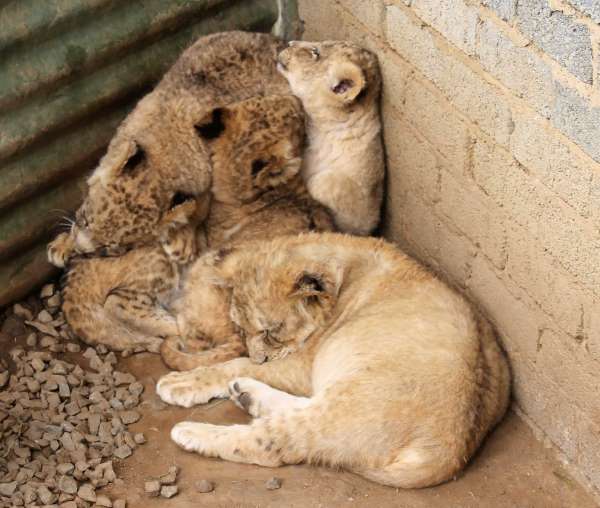
After a year of intense research, it was apparent that very few people were aware of the full extent of the industry. Pippa felt strongly that the world needed to know, and decided that a film would be the fastest and most expedient way to create global awareness around what she saw as being total exploitation. “I was not a film maker by profession, so I knew I needed a very special team who not only had the skills to help me, but who also shared my vision,” she recalls.
A small but incredibly passionate and dedicated team came together and they immediately started filming. Working tirelessly for two and a half years, the team travelled around South Africa visiting numerous captive predator breeding farms, and conducting interviews with experts linked to all aspects of the industry.
After seeing the rough cut of Blood Lions®, PBS International in the USA expressed interest in the film, and a distribution agreement was signed a few months later. Since then, the film has been aired via MSNBC, Discovery International, Animal Planet, SABC and a number of other TV channels in approximately 150 countries and/or territories around the world.
https://www.facebook.com/BloodLionsOfficial/videos/342878606278701/
At the time of the film’s premier, the Blood Lions® team set up the global Blood Lions Campaign to continue to shine a light on the captive lion breeding industry, and to create global awareness to effect change.

Although Pippa’s passion for wildlife extends to all animals, it was incomprehensible to her that these magnificent predators should be exploited in such a way. Lions are not only iconic, but they are keystone species at the pinnacle of the food chain, and play a critical role in the environment. There was no doubt in her mind that they are wild creatures which should be allowed to live out their lives in their natural habitat, not forced into captivity to be mass bred simply for the bullet. To lion breeders in South Africa, they are seen simply as commodities to be used to generate a lucrative income through interactive tourism, trophy hunting and the sale of their body parts. In a nutshell, captive bred lions and other predators in South Africa lead heart-breaking lives and the cycle never ends. This is often the same scenario with cheetah, leopard and tiger. It is now estimated that there are between 8,000 and 12,000 predators currently being held captive in over 250 breeding facilities across South Africa…very similar to “puppy mills” in the United States.
Generally, lion cubs born in captivity in South Africa are removed from their mothers within the first week of birth, and are passed off as ‘orphans’ or ‘rescues’. This practice of removing the cubs forces the females into intensive breeding cycles where lionesses produce 4 to 5 more litters of cubs than they would in the wild. These tiny cubs are bottle fed, petted and hand-reared by paying tourists and volunteers who are led to believe that they are supporting authentic conservation projects to rehabilitate these predators back into the wild. Most are unaware that their money regularly contributes to fraudulent and exploitative use of these animals, often diverting much needed funds away from bona fide scientific research.
When the cubs grow too old for “pay and play” activities, many are moved to facilities that offer “walking with lions” tourist attractions. These sub-adult lions are trained, often in the same way as circus animals, to climb trees and pose for ‘selfies’ with paying tourists:
https://www.facebook.com/BloodLionsOfficial/videos/1039594396154923/
Once these lions become too dangerous to be in contact with humans, some go to canned hunting facilities where they are shot in confined enclosures by trophy hunters. Others are sold to zoos or traders as breeding stock for new facilities, or private collections around the world. Completing the cycle of exploitation, lions that are not used for the above purposes are euthanized or slaughtered for their body parts to be exported to South East Asia to supplement the "tiger bone trade”. The skeletons and bones are utilised for medicinal and aphrodisiacal purposes in the production of what is called “tiger wine” and "tiger cake”, and also for use in “tiger bone jewellery”:
https://www.facebook.com/BloodLionsOfficial/videos/1062460323868330/
This trade is extremely worrying from a welfare perspective, as animals shot for their trophies in canned hunts, and are required to be in a reasonably good condition, whereas lions bred for the bone trade are bred intensively with little or no consideration towards their health or welfare:
https://www.facebook.com/BloodLionsOfficial/videos/1447633032017722/
Internationally recognised scientists and conservationists generally agree that the lion bone industry is extremely concerning from a conservation perspective. The demand for lion bones from Asia has increased dramatically over the last few years, leading to fears that this demand will inevitably put pressure on wild populations, as poaching increases and the illegal trade intensifies.
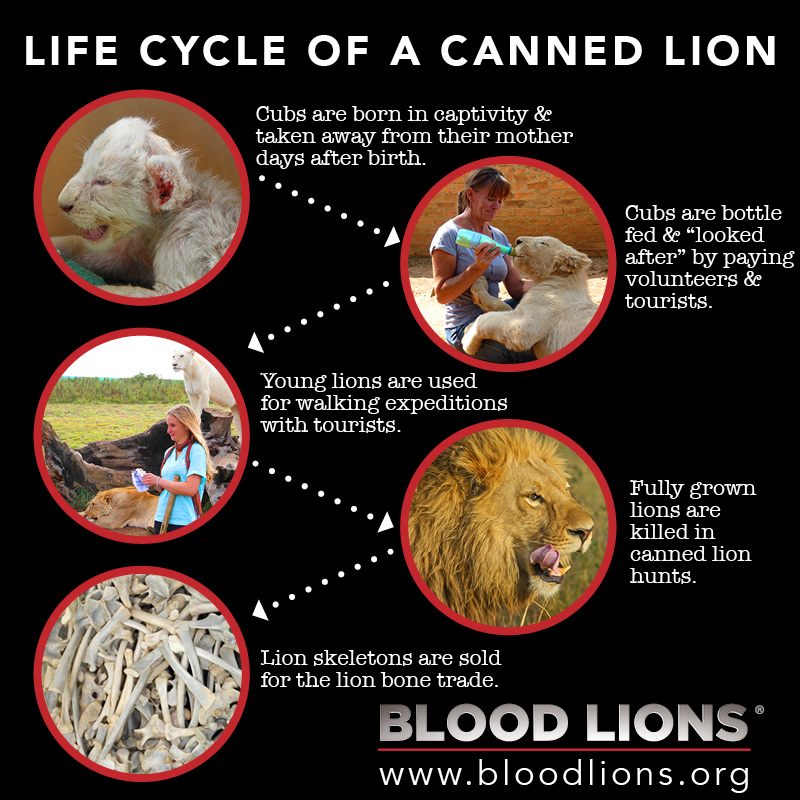
Although the laws around canned hunting in other African countries are not familiar, the law in South Africa regarding canned hunting is confusing, as “canned” hunting is prohibited but “captive” hunting is permitted. Broadly speaking, the term canned hunting refers to the shooting of captive bred lions (which are mostly tame or human habituated) in confined areas. It also covers other definitions such as high-fence hunting and ranch hunting, so has become synonymous with any form of trophy hunting where the animal has little or no chance of escaping the hunter: https://www.facebook.com/BloodLionsOfficial/videos/1029996973781332/
The welfare of captive bred predators falls through the legislative cracks, with no one from the Department of Environment, Forestry & Fisheries (DEFF) or the Department of Agriculture, Rural Development and Land Reform (DARDLR) willing to accept responsibility. DEFF legislates mostly on wild species and for biodiversity objectives, and considers welfare to be the responsibility of the DARDLR which—although it has a sub-division which deals with wildlife ranching involving minimal human intervention—apparently does not have the resources to monitor the captive predator breeding industry, as their focus is on domestic farmed animals such as cattle, sheep and pigs. The industry has been pretty much left to self-regulate, with the welfare mandate falling to the NSPCA.
The Blood Lions team attended a two-day colloquium in Parliament in August 2018, which was convened by the Portfolio Committee on Environmental Affairs (PCEA) to discuss the industry. The colloquium was closely followed by the PCEA's Report strongly recommending that the DEFF "should as a matter of urgency initiate a policy and legislative review of CLB for hunting and lion bone trade with a view of putting an end to this practice.” Shockingly, the PCEA Report was ignored. At a meeting in March this year the DEFF proposed that the CLB be continued as long it is regulated and appropriated legislated. This is extremely concerning, especially in light of the fact that in Asia it has been found that legal trade fuels demand, and that it stimulates illegal trafficking and the poaching of predators in the wild.
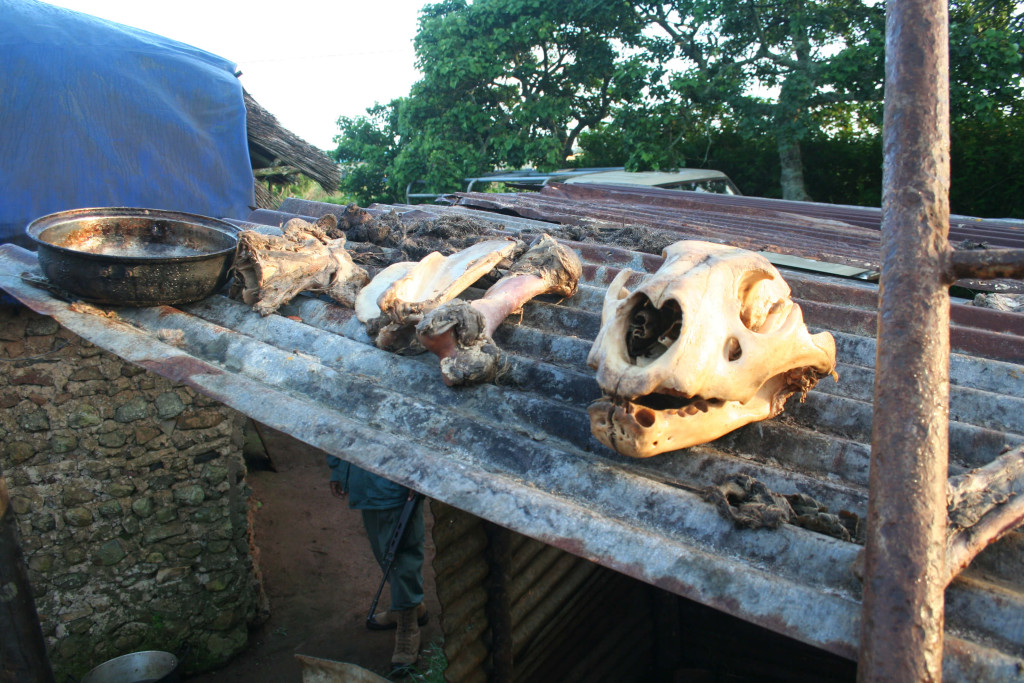
Awareness is key. Travellers and visitors to South Africa must “THINK before they VISIT, CUDDLE, WALK or VOLUNTEER with lions”. To support this, we launched the Blood Lions ‘Born to Live Wild’ Tourism Campaign and Pledge. To date, the pledge has been signed by over 160 travel organisations, representing close to 3,000 members globally, distancing themselves from all forms of interactive wildlife tourism, including petting cubs and ‘walking with lions’ activities. Your African Safari has signed this pledge and does not allow itineries that include any human interaction with lions or other big cats.
By signing our pledge, these travel operators have committed to “not knowingly book or support any breeder or operator that contributes to the cycle of breeding, exploitation and senseless killing of predators". Furthermore, our “Born to Live Wild” pledge signatories actively discourage requests from tourists asking for predator interactions to be included in their itineraries when visiting South Africa, and will often refer to the Blood Lions website in this regard. Those who sign the Pledge also commit to “securing the survival of Africa’s predators in the wild by supporting and promoting Africa as an authentic, wild and ethical tourism destination”. Many key international organisations have signed the Pledge, including National Geographic, Atta, Tourvest, Cullinan Holdings and The Travel Corporation.
It is important to remember that although the captive predator breeding industry has grown exponentially over the last twenty years and despite claims made by the breeders, internationally recognised tourism agencies and conservationists concur that the captive lion breeding industry has no conservation value whatsoever, and that it is detrimental to South Africa’s tourism reputation. Visitors come to South Africa from all over the world to see Africa’s iconic wildlife in its natural habitat. The reality is that without wild lions and the rest of the predator guild existing in functioning ecosystems, there would be no tourism industry… and this would be a disastrous situation for many economies.
As our focus on the captive lion breeding industry has been on South Africa, we are not aware of the extent of it in other countries. Furthermore, nobody knows the exact number of predators in captivity in South Africa as the breeding industry has not been officially audited. However, according to government and private sector sources, it is generally accepted that the estimate is somewhere between 8,000 and 10,000 predators being bred on more than 250 breeding farms across South Africa at the moment.
The captive breeding facilities are all privately owned, and are not legally obliged to register with any organization, although some have formed a breeding association known as SAPA. The vast majority of these predators are lions, but there are also other species currently being bred in captivity including cheetah and leopard, as well as a host of exotic animals such as tiger, jaguar and puma.
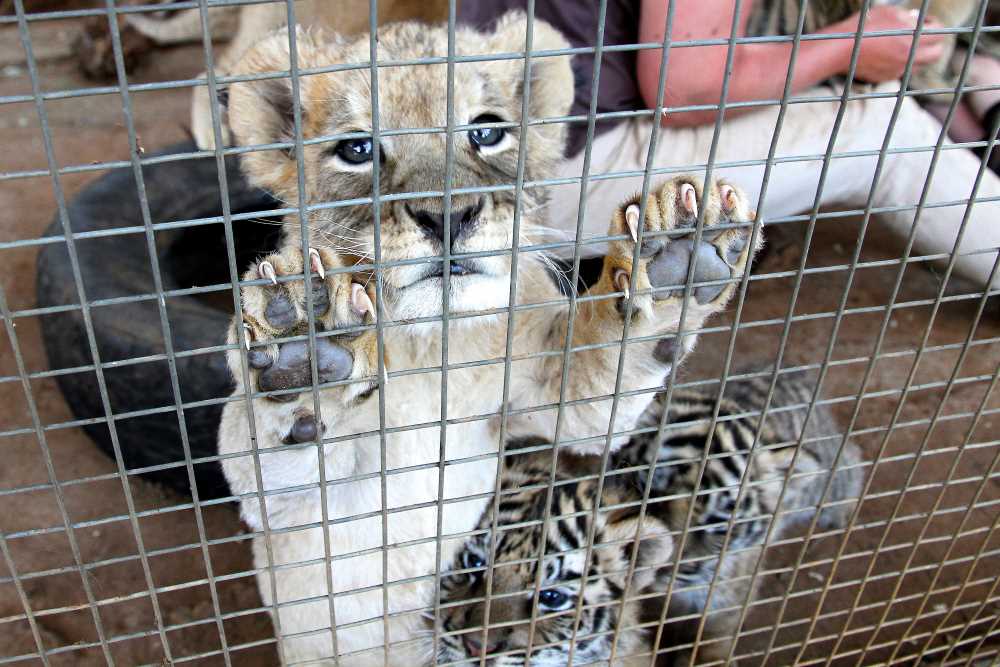
The Blood Lions ‘Born to Live Wild’ tourism Campaign won the Gold Award for “Best Responsible Tourism Campaign” as well as joint “Overall Winner” at the African Responsible Tourism Awards 2017. Our awards were very well received by the international travel industry, which we believe is a clear indication of the global move away from all forms of interactive wildlife tourism.
Blood Lions and other previous ARTA winners were invited to speak on their achievements at this year’s World Travel Market (WTM) Africa in Cape Town this year. Due to some unfortunate circumstances, they were precluded from presenting as per the official schedule. However, we are very pleased to have been invited to present at ARTA20 next year.
The Blood Lions ‘Born to Live Wild’ initiative is a global tourism campaign. Our pledge has been signed by approximately 170 tourism operators worldwide, each of whom have committed to not support exploitative predator interactive tourism. In May this year, Cullinan Holdings, The Travel Corporation and the TreadRight Foundation indicated that they would like to support our campaign by adding their logos to the pledge. Comprising more than 50 brands and travel companies, the addition of this group is very significant, and we are proud they have partnered with them on this important campaign.
The ‘Born to Live Wild’ Campaign webpage on the Blood Lions website contains the logos of all the tour operators and organisations who have signed the Pledge and joined the Campaign: http://www.bloodlions.org/born-to-live-wild/.
The overarching Blood Lions Campaign consists of two sub-campaigns, namely the Born to Live Wild campaign and the #YouthForLions campaign. The Blood Lions ‘YouthForLions’ campaign is a global movement aimed at informing and engaging the world's youth around the realities of tourist activities that exploit lions, such as cub petting and ‘walking with lions’ attractions. We invite the youth to get involved and form part of this world wide movement aimed at discouraging these interactive activities that feed into the canned hunting and lion bone trade industries.
The 16th of June in South Africa serves to commemorate a day in 1979 when South African youth banded together and changed the course of our history. This Youth Day, the Blood Lions ‘YouthForLions’ team called upon the youth of South Africa to stand together and speak up against the injustices of captive predator breeding. An open letter signed by over 300 South African youths was sent to the Presidency as well as the Departments of Environment, Forest and Fisheries, Basic Education and Higher Education calling for an end to the captive breeding and commercial exploitation of wildlife across South Africa:
http://www.bloodlions.org/wp-content/uploads/2019/06/Open-Letter-from-Youth.-Signed.pdf
This Youth Day initiative follows the decision made by the Department of Environmental Affairs in March 2019 to allow the captive lion breeding industry to continue with regulations in place, despite the recommendations and resolutions made by the Portfolio Committee of Environmental Affairs (PCEA) towards the end of 2018 to put an end to the practice. The PCEA confirmed that “there was an overwhelming consensus for the need to bring an end to the controversial aspects of the captive lion breeding industry in South Africa” and that the industry is, in fact, a blemish on South Africa’s conservation reputation and tourism image. Leading global conservation and scientific authorities have stated time and time again that the captive predator breeding industry has no conservation value, and goes against internationally accepted ethical and welfare protocols.
The 324 youth who signed the open letter agree that trying to regulate an industry that has been thriving for over a decade under ineffective governance is unfortunately not the answer. “The youth are vastly more powerful and influential as a collective,” says Blood Lions ‘YouthForLions’ Coordinator, Cath Jakins. “I have been completely blown away by the support for this Open Letter and am immensely proud to have been a part of it. I implore the President and his Ministers to listen to the voices of the youth and hear their message,” says Jakins.

If a facility is presented as a sanctuary, it is very easy to ascertain if this is correct or not by asking the right questions. A bona fide sanctuary does not breed or trade animals, nor does it allow any human interaction with them. It is also important to ask where the cubs come from and where they go, once they reach adulthood. Visitors are very often told the cubs are “orphans” and that the adult lions will be “re-wilded” into reserves, but this is seldom the case.
There are many ways in which the public can create awareness around the captive lion breeding and canned hunting industry, and to prevent lion abuse. We urge members of the public to:
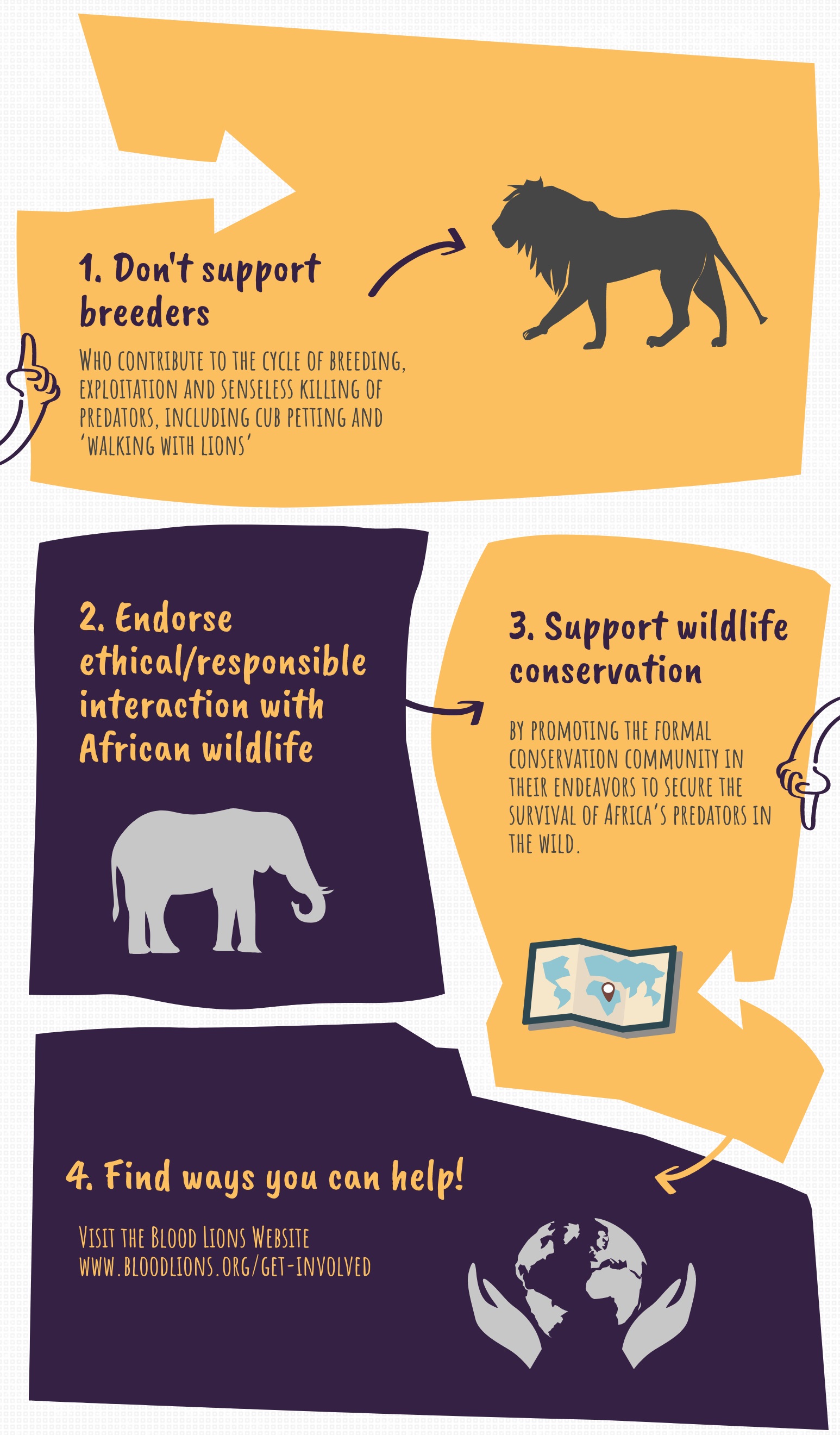
The Blood Lions Campaign team also encourages as many people as possible to:
Videos
https://www.facebook.com/BloodLionsOfficial/videos/342878606278701/.
Has been on: 15 safaris
Your African Safari (YAS) is a safari-planning resource for anyone planning an African safari. It features information on over 2600 tour operators including company and vehicle descriptions, user reviews, safari itineraries and photos. It also features detailed information on 14 countries and 84 parks and game reserves.
© Your African Safari Ltd, All rights reserved.
Your African Safari is a safari-planning and safari review site. It was created to help support a healthy African wildlife population. All reviews are vetted before being approved and only ethical tours are published